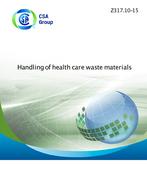Preface
This is the fourth edition of CSA Z317.10, Handling of health care waste materials. It supersedes the previous edition, published in 2009 under the title Handling of waste materials in health care facilities and veterinary health care facilities. It is one of a series of Standards related to health care facility engineering and sets forth preventive measures intended to protect patients, staff, visitors, and the public from exposure to potentially hazardous waste materials. This Standard specifies requirements for the packaging, collection, storage, handling, treatment, and disposal of waste materials within health care facilities and veterinary health care facilities. This Standard also includes guidance for health care waste materials generated outside of traditional health care settings (e.g., health care in the home environment, waste generated or recovered during emergency response activities). This Standard is also intended to assist in the reduction of waste by providing recommended recycling practices. Major changes in this fourth edition include the following: a) updating current waste handling practices related to chemical, cytotoxic, and radioactive waste streams; b) guidance for health care waste generated outside of health care and veterinary health care facilities based on the recognition that health care is increasingly being administered outside of traditional acute care hospitals; and c) guidance for health care waste generated from Emergency Medical Services (EMS) and First Responder (FR) activities.
Scope
1.1 This Standard specifies requirements for the packaging, collection, handling, storage, and on-site treatment and disposal of health care waste materials. 1.2 1.2.1 This Standard applies to health care and veterinary-related waste, and health care-related waste generated in non-traditional health care settings. 1.2.2 “Health care and veterinary” refers to a) health care facilities and mobile units; b) veterinary facilities and mobile units; c) blood banks; and d) blood collection centres. Note: See Annex C for examples of health care facilities. 1.2.3 Biomedical waste generated in non-traditional health care settings includes health care-related waste generated a) in the home environment; and b) during emergency medical services/pre-hospital care. Note: This Standard may also be applied to the following: a) medical research and teaching facilities; b) veterinary research and teaching facilities; c) clinical and research laboratories where the waste generated is within the scope of this Standard; d) vaccine production facilities; e) vaccine testing facilities; f) mortuaries and funeral homes; g) coroners’ laboratories; and h) personal service facilities (e.g., providing tattoo, ear/body piercing, aesthetic, and electrolysis services). 1.3 This Standard does not provide technical requirements for off-site transportation or disposal of waste after removal. Note: Such requirements are specified in federal, provincial/territorial, and municipal regulations and legislation. 1.4 This Standard does not address the special precautions associated with material contaminated with infectious substances requiring a Containment Level 3 or higher, with the exception of the requirements in Clause 5.4.5 and the guidance in Annex F. Notes: 1) For further information, see the most current edition of the Canadian Biosafety Standards and Guidelines, see the Human Pathogens and Toxins Act, and see the Transportation of Dangerous Goods Regulations. 2) For infection control guidelines and fact sheets on specific infectious diseases, including Ebola virus disease, refer to the Public Health Agency of Canada website: http://www.phac-aspc.gc.ca/id-mi/index-eng.php. Pathogen safety data sheets are available at http://www.phac-aspc.gc.ca/lab-bio/res/psds-ftss/index-eng.php. 1.5 In this Standard, “shall” is used to express a requirement, i.e., a provision that the user is obliged to satisfy in order to comply with the standard; “should” is used to express a recommendation or that which is advised but not required; and “may” is used to express an option or that which is permissible within the limits of the standard. Notes accompanying clauses do not include requirements or alternative requirements; the purpose of a note accompanying a clause is to separate from the text explanatory or informative material. Notes to tables and figures are considered part of the table or figure and may be written as requirements. Annexes are designated normative (mandatory) or informative (non-mandatory) to define their application.
Product Details
- Edition:
- 4th
- Published:
- 09/01/2015
- ISBN(s):
- 9781488300790
- Number of Pages:
- 61
- File Size:
- 1 file , 1.9 MB
- Product Code(s):
- 2423936, 2424294, 2423936, 2423936
